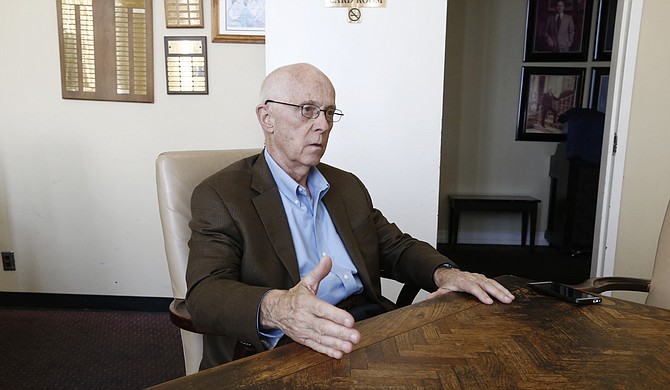Since losing his seat in redistricting, Rep. Cecil Brown, D-Jackson, decided to run for the Public Service Commission. Photo by Imani Khayyam.
A casualty of legislative redistricting, Democratic Rep. Cecil Brown would have had to run for re-election in a Republican-leaning district to remain in the Mississippi Legislature. When he heard that Lynn Posey, the Republican Central District representative to the Mississippi Public Service Commission, was leaning toward not running for re-election, Brown decided to run.
Now retired from a 40-year career as a certified public accountant and money manager, Brown wants to bring his experience analyzing financial deals to the PSC, which regulates utility companies. Brown recently talked to the Jackson Free Press about the Kemper Energy Facility near DeKalb, and the future of energy in Mississippi.
As a financial adviser, how would you rate the Kemper deal?
For the company (Mississippi Power Company), it's a disaster. They were originally talking about a $2-billion plant. The numbers have increased over time. They've gone up to $6 billion now, and it's rising every month. It could be really bad for the consumer, and that's the part I'm concerned about. My position is the customers of Mississippi Power Company should not have to pay for mistakes they made and that their parent company, Southern Company, made. I think I have the background and experience to make reasonable judgments about that.
What more should the PSC do about Kemper?
You've got a plant over there that's an experimental plant. There's never been a plant in the world built like that plant. It is using technology, the patent for which (belongs to) Southern Company, the parent of Mississippi Power Company. So nobody's exactly sure what's going to happen when they turn the switch. It could work fine; it could produce syngas (synthetic gas) to run the plant. In fact, the combined cycle part of the plant is running today on natural gas. Once they try to switch it over to synthetic gas, nobody knows exactly what's going to happen. But assuming it works OK, there's still the question of who's going to pay for it because there's still the $6 billion-plus price tag.
Somewhere between $2 billion and $6 billion, there's a number that may be justifiable if the plant works. If the plant does not work, that's a whole other question. Let's suppose they turn the switch on, and this process doesn't work. Then somebody's still got to pay for (the plant). If that happens, then I don't think the ratepayer pays for any of that part of the plant.
What are the lessons from Kemper?
The biggest lessons from Kemper are about not beginning a project when you don't know what it's going to cost. That's just a lesson in management, not in terms of energy. And I want to make it clear that I'm not anti-Mississippi Power Company. Mississippi Power Company itself has a reputation of being a good corporate citizen. They've done a lot of good things for the Gulf Coast. I'm not out as a positional commissioner to punish the company. But my job would be to represent the ratepayers, and I don't think their ratepayers should pay for the gigantic mistake they made.
You've called for a review of the project. Who should lead that review?
I would like to keep the Legislature out of this—not that they don't have a right to be in it, but the Legislature has a way sometimes of chasing rabbits. I think the Public Service Commission and its staff should review what went on with Kemper from beginning to end. I'd like to ... see what mistakes the commission itself made. Then we need to go back and review the Baseload Act. I voted for the Baseload Act. I want to see if there was something that should have been in the legislation that was not there.
Editor's note: The Baseload Act of 2008 lets utility companies to charge ratepayers for certain costs associated with new power plants while the facilities are still under construction.
How will the experience with Kemper factor into future discussions about net metering, solar and alternative energy?
The mistakes that have been made have been government mistakes: funding KiOR and funding these projects where the government agencies didn't do enough due diligence to use taxpayer funds for something that was unproven. I think the State of Mississippi needs to stay out of the venture-capital business. There are lot of things that we can do for companies in terms of providing services, but I think we would have learned our lesson by now that unproven businesses should not be funded by the State of Mississippi.
I am for alternative energy sources. I just don't know that we need to jump in whole hog. Energy companies are investing in pilot projects all over the state. Entergy's doing that, (South Mississippi Electric Power Association) is doing that, Mississippi Power is doing that. Solar is going to be part of their array of energy sources in the future.
We're always going to have a need for the grid. The grid now is hooked up to all these major power plants, and I think that's going to be there for the foreseeable future. A lot of people are not going to go for solar; they're not going to want to put solar panels on their houses. We've also got the issue of wind power—is wind power feasible in Mississippi? But I don't think public money needs to go into any of that. If it works, it works, and if it works the economy will reward the people who did that.
Comment and read more election coverage at www.jfp.ms/2015elections. Email R.L. Nave at rlnave@jacksonfreepress.com.



Comments
Use the comment form below to begin a discussion about this content.